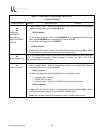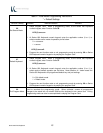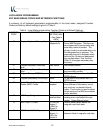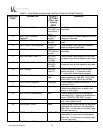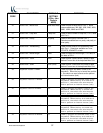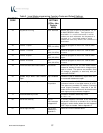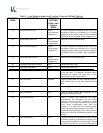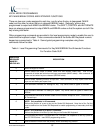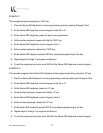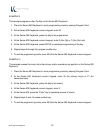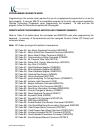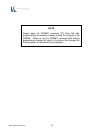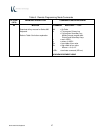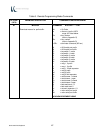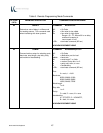
Series 600 POS Keyboard 36
LOCAL MODE PROGRAMMING
KEY MAKE/BREAK CODES AND EXTENDED FUNCTIONS
There are two scan codes assigned to each key, one for when the key is depressed (MAKE
code) and the other for when the key is released (BREAK code). Generally, all keys are
programmed to output both MAKE and BREAK codes. The SHIFT, CONTROL and ALTERNATE
keys are always programmed to output MAKE and BREAK codes so that the system can tell if the
key is being held down.
Other programming commands are provided in the local programming mode to enable the user to
customize the keyboard output. These commands entered at the Series 600 Keyboard numeric
keypad are summarized in Table 4. Some typical programming examples using these
commands follow the table.
Table 4. Local Programming Commands For Key MAKE/BREAK And Extended Functions
For Function Code 00,01
SERIES 600
KEYBOARD
NUMERIC
KEYPAD NO.
DESCRIPTION
0 Aborts changes to macros.
1
Defines where the output of MAKE codes end and BREAK codes start. Prior to this
command, all codes are sent when the keys are pressed (MAKE codes). After command, all
codes are sent when keys are released (BREAK codes).
2 Defines where repeating function of keys start. After command, all keys repeat code when
keys are held down past repeat time.
3
This command overrides PC settings for key. Key sends code as typed on BREAK.
4 This command overrides PC setting for repeat. Key sends code as typed on MAKE and
BREAK.
5 This command removes all BREAK codes from the macros except for SHIFT, CONTROL and
ALTernate keys.
6
NOTE: Only available in 00 command.
Defines the position of a sec op key on the Series 600 Keyboard. Note that a Sec Op Key
must be defined on the Series 600 Keyboard to enable programming of secondary-level key
codes.
7 NOTE: Only available in 00 and 01 commands.
Defines the position of left Sec Op Lock Key on the Series 600 Keyboard.
8 This command will add a CTRL/BREAK/CTRL, BREAK/CTRL sequence to the key (used for
the UTC OPOS driver – see OPOS programming section.
9 Used to erase the macro from the primary and/or secondary key position.



